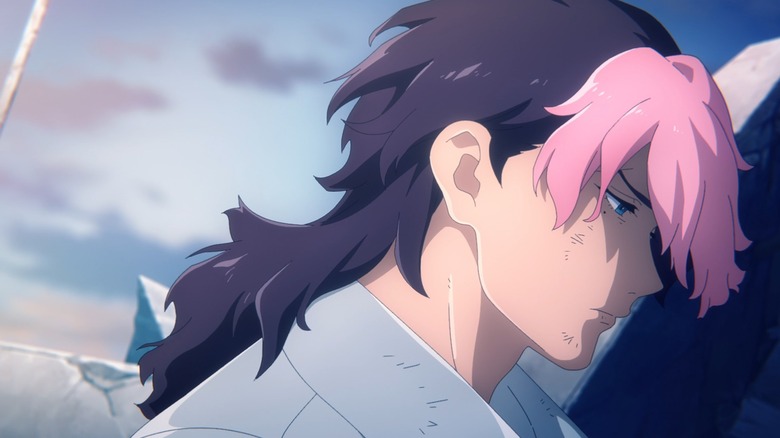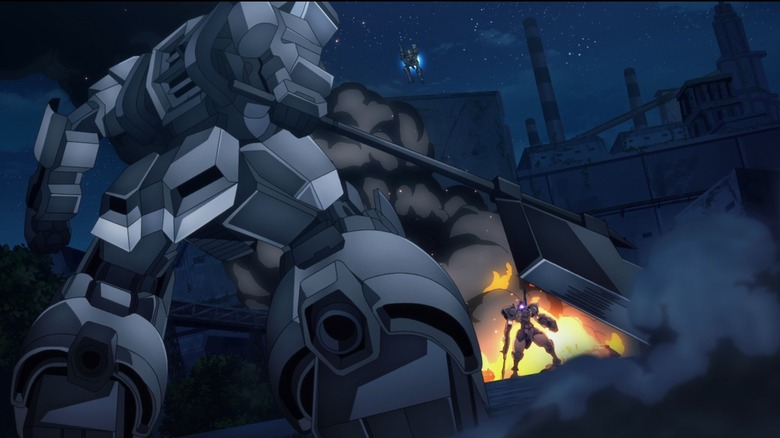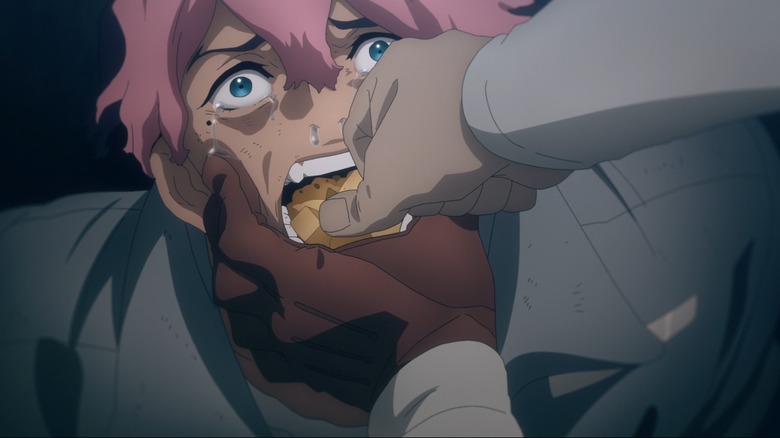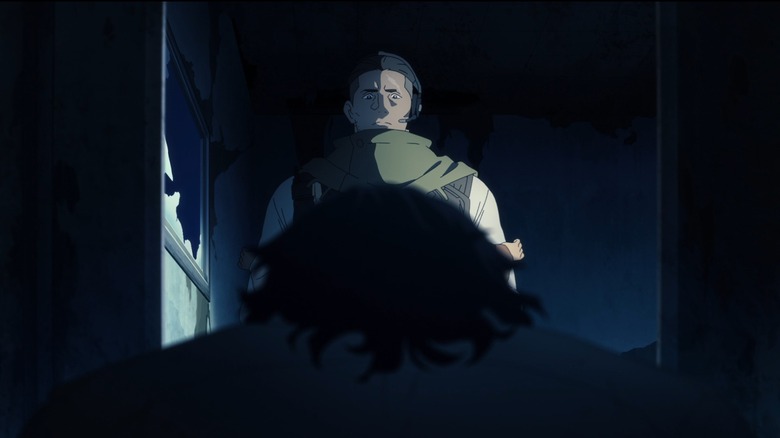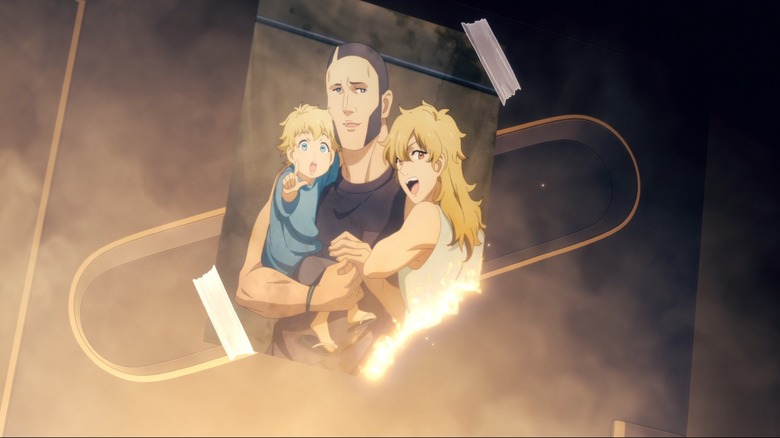Mobile Suit Gundam: Witch From Mercury Brings Back Guel In Father And Child
The second season premiere of "Mobile Suit Gundam: The Witch From Mercury" followed the action-packed first season finale by returning to the status quo at Asticassia School of Technology. The next episode blew it up, killing characters and breaking Asticassia beyond repair. Now in this third episode, we leave Asticassia for the most part. Nika and Miorine appear, Shaddiq chats with his (kidnapped) guardian, but the heroine Suletta is totally absent. It's another big twist in a season that's leaned on shock and awe, catching the viewer's attention with the right hand to hide what's in the left. These sorts of magicians' tricks only work so long as the viewer is willing to suspend their sense of disbelief. Thankfully "The Witch From Mercury" is generous. The staff is very good at conditioning the audience, predicting what they want and then giving it to them when they least expect it or most dread it.
So it goes that "Father and Son" is the first episode of the season in which Guel appears. Up to this point, our favorite failson has only appeared as a sad boy in the opening. His return to the series is overdue, and yet comes as a surprise. After all, in the previous episode, the viewer learned that Suletta's sister Ericht is inside the Aerial. There are bigger fish to fry than minnows like Guel. But I suppose that's why "Witch From Mercury" takes this moment to bring him back. There are people in "Witch From Mercury" who are not just cute teenage girls or men with ideas. This episode is about them.
Ground zero
If not for the sections featuring Asticassia students, "Father and Son" could stand alone. The story takes place on Earth. Benefit security forces are coming for Dawn of Fold, who hospitalized President Delling and attacked Asticassia during its open house. Dawn of Fold has been providing for refugees, and those refugees must escape before they are killed in the crossfire. A unit of giant robot pilots is all that stands between Spacian killers and the refugee transport ship. The high technology flourishes of "Witch From Mercury" are substituted for the gritty war drama of "Mobile Suit Gundam: 08th MS Team." Our heroes must fight laser-mounted, missile-packing robots with fold-out axes and gun-mounted trucks. These pilots are adults with children, not children themselves. By the end of the episode, most of them will be dead.
Throughout "Witch From Mercury," some fans have been crying for a return to the "Gundam" of old. A "Gundam" that takes its cues from military fiction rather than young adult drama. "Father and Son" reveals that military fiction was always the other side of the young adult drama coin. But it does this by taking shortcuts. Most of the characters we meet in this episode are archetypes. Jalil is an impulsive newbie. Phillip has children. When Jalil breaks cover to attack Benerit forces, the viewer says "of course." When Phillip sacrifices himself and we see the photo of his children burning in the robot cockpit, the viewer might roll their eyes. Once again "Witch From Mercury" sacrifices nuance for blunt effectiveness. There is no time for anything but the biggest of swings.
Kicking the dog
Once Miorine's fiance and the pride of Asticassia, Guel begins this episode by being force-fed dinner by competent Dawn of Fold soldier Olcott. Meanwhile, a young Earthian girl named Seethia mourns her father's disappearance. "Instead of Dad," she yells at Guel, "why'd they bring you back!?" "Why me and not Dad?" Guel moans in response. Both of these kids have lost their fathers, and yet they are incapable of sharing their grief. The great "Gundam" theme of communication, and miscommunication, rears its head. As a starving, bereft child, though, Seethia has an excuse. Guel has none. The Dawn of Fold fighters wonder why they even keep him around, when Guel's family teeters on the edge of bankruptcy. When an errant missile nearly crushes him halfway through this episode, it plays as yet another cosmic joke at his expense.
Yet Guel distinguishes himself in this episode, too. He climbs out of the rubble and runs a dying Seethia to safety, even after Olcott gave her up for dead. He hauls a corpse out of a crashed robot and overcomes nausea to pilot it. Guel's actions are in vain, as Seethia dies before he finds somebody that can treat her. It's possible that Seethia was too far gone even by the time Guel decided to save her. But this episode implies that the refugee ship only managed to escape because of Guel's actions. He did not save the day through combat prowess or nobility. All he did was be in the right place at the right time so that an enemy combatant makes the wrong choice. Guel's stupidity saves lives. It is an embarrassing but fitting achievement for somebody like him, who still has a long way to go.
Fathers and mothers
I also liked Olcott, who we spend plenty of time with this episode. He's another archetype of course. Once a member of the powerful Dominicus force, he loses his son and joins Dawn of Fold. Another sad dad in an episode full of them. What distinguishes Olcott, though, is that he's a good sad dad. While Shaddiq's guardian Sarius insists on the importance of "war partitioning" with a capitalist's zeal, Olcott inspires Guel through his actions rather than lecture. He's just the example Guel needs to break out of his funk, even if that example feeds into Guel's learned paternalism. Speaking of paternalism, we also learn after the episode credits that Miorine's father Delling obliterated Ochs Earth out of idealism rather than opportunism. He feared what Gundams represented rather than the threat they posed to the Benerit Group's interests. Right on cue, we begin the Delling redemption tour.
But I can't help but wonder about Miorine's mother. This episode confirms that it was her, rather than Delling, who was the genesis of the Quiet Zero project. Her belief was that "the various survival strategies used by plants could also be applied to humanity." Not only does this statement position her in the center of the narrative, it reveals a connection with Miorine's greenhouse. In the opening credits sequence, we briefly see a child reach for tomatoes while sitting next to a silver-haired woman. If this woman is Miorine's mother Nortette, then we know exactly what it means when Miorine entrusts her greenhouse to Suletta. It's the last remnant of a woman whose actions continue to shape the narrative of "Witch From Mercury" long after her death. Mothers and daughters will have their day for good or ill.
This week's addendum
The Robot Watch: The Dawn of Fold soldiers this week pilot Prodoros units, cyclopean robots with mounted guns and fold-out blades. I enjoyed the contrast this week between the missiles and lasers of the Benerit group and the relatively down-to-earth weaponry of the Earthians. The blades especially evoke "Iron Blooded Orphans," a previous "Gundam" iteration that featured physical, "low-tech" weaponry.
Guerilla Warfare: Loved every sequence in this episode where Dawn of Fold soldiers blew up giant robots with trucks. It's a reminder that the machines of "Gundam" are physical objects rather than the superheroes of "super robot" media, as outrageously powerful as they can become.
Remembering Sophie: It's telling that Sophie's friends on Earth made a grave for her. Another reminder that what happens at Asticassia affects the rest of the world, too. Every appearance of Sophie's stuffed animals is a carefully calibrated knife in the heart.
Utena Watch: Not much to do with this episode, but it occurred to me after watching the last episode that the "curse of Gundam" that affects pilots isn't so different from the swords of hate in "Utena." Aerial (and Ericht?) takes the punishment so that Suletta won't have to. In the same way, Earth bears the weight of space. It's Omelas all the way down. What might happen if this was to be reversed?
Where is Chuchu: Where is she?
Friends of Gundam: I enjoyed reading Joshua Rivera's piece for Polygon recently, where he convincingly argues that "Witch From Mercury" is the "ultimate 'Gundam' series" (which is not the same as the best.) Thaliarchus's Twitter thread on the show continues to be worth reading as well, especially to contextualize the show's connections with earlier "Gundam" series. In the meantime, here's some more "Gundam" fanart.
